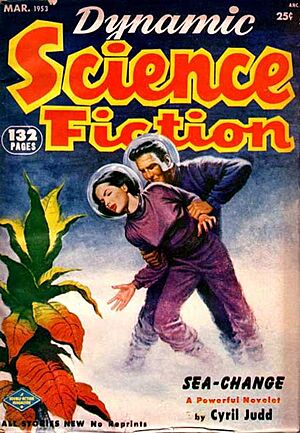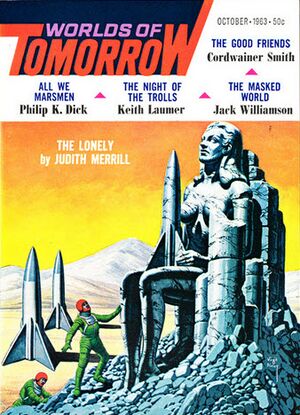Judith Merril facts for kids
Quick facts for kids
Judith Merril
|
|
|---|---|
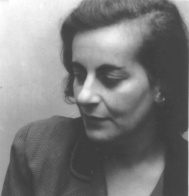 |
|
| Born | Judith Josephine Grossman January 21, 1923 Boston, Massachusetts, U.S. |
| Died | September 12, 1997 (aged 74) Toronto, Ontario, Canada |
| Occupation |
|
| Nationality | USA Canada |
| Genre | Science fiction |
| Spouse |
|
Judith Josephine Grossman (born January 21, 1923 – died September 12, 1997) was a very important writer and editor. She used the pen-name Judith Merril starting around 1945. She was from the United States and later became a Canadian citizen.
Judith Merril was one of the first women to become widely known and influential in the world of science fiction. She wrote many novels and short stories. She also edited many collections of stories called anthologies.
Contents
Early Life and Interests
Judith Merril was born in Boston in 1923. Her parents, Ethel and Samuel Grossman, were Jewish. Her father passed away when she was young, in 1929.
In 1936, her family moved to the Bronx in New York City. As a teenager, Judith became interested in political ideas. These ideas focused on fairness and improving society for everyone.
Her mother, Ethel Grossman, was a strong woman who fought for women's rights. She helped start a women's group called Hadassah.
In 1939, Judith graduated from high school at age 16. She continued to think about politics and how the world worked. The next year, she married Dan Zissman. Their daughter, Merril Zissman, was born in 1942.
During this time, Judith joined a group of science fiction writers, editors, and fans called the Futurians. This group included other famous writers like Cyril M. Kornbluth and Frederik Pohl. Judith and Dan Zissman separated around 1945. She later married Frederik Pohl in 1948, but they divorced in 1952.
Science Fiction Writing and Editing in America
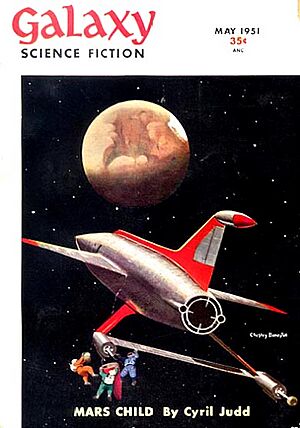
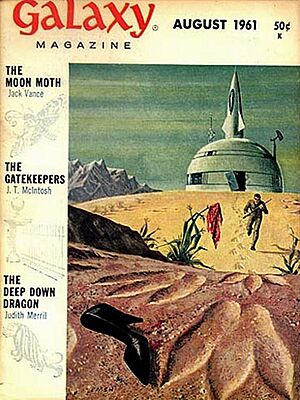
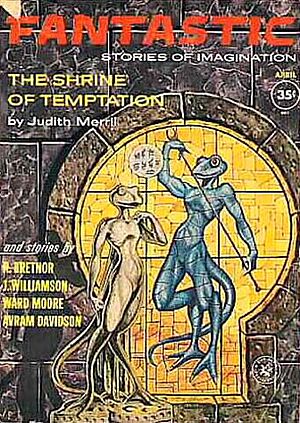
Judith Merril started writing professionally in 1945. Her first science fiction story was published in 1948. She also helped start the Hydra Club, a group for science fiction fans and writers.
One of her stories, Dead Center, was chosen for a collection called Best American Short Stories. This was a big deal because very few science fiction stories were included in such mainstream collections back then. Her first novel, Shadow on the Hearth, was also praised for its sensitive storytelling.
In 1950, her second child, Ann Pohl, was born. Judith Merril began editing science fiction short story collections in 1950. She became very well known for her "Year's Best" story series, which ran from 1956 to 1967. She believed that science fiction should be seen as important literature, not just a separate genre.
Judith Merril, along with other authors like James Blish and Damon Knight, worked to make science fiction writing better. They helped create the Milford Writer's Workshop in Pennsylvania. At these workshops, writers could share their stories and get feedback to improve them. This helped writers become more professional.
Merril also played a role in the "New Wave" movement in science fiction. This movement brought new ideas and styles to the genre. She edited an anthology called England Swings SF in 1968, which featured many New Wave stories.
In 1966, a TV show called The Man from UNCLE used a character name similar to "Judith Merril." This caused a legal issue, and the character's name was later changed.
Life in Canada
In the late 1960s, Judith Merril moved to Toronto, Ontario, Canada. She moved because she disagreed with the U.S. government's actions during the Vietnam War.
She became a founding resident of Rochdale College. This was an experimental place where students lived and learned together. Merril shared her large collection of books and writings there.
In 1970, she started a special collection at the Toronto Public Library. She wanted to collect every science fiction book published in English. She donated all her own books and magazines to the library. This collection was first called the "Spaced Out Library" and later renamed the Merril Collection of Science Fiction, Speculation, and Fantasy. She worked there as a curator, helping to organize the collection.
From 1978 to 1981, Merril introduced Canadian broadcasts of the TV show Doctor Who. She was known as the "Undoctor" and gave short talks about the show's ideas.
Judith Merril was very active in promoting science fiction in Canada. She started the Hydra North network for writers. In 1985, she launched Tesseract, a series of anthologies that showcased Canadian science fiction.
She also donated her large collection of letters and writings to the National Archives of Canada. In 1976, Merril became a Canadian citizen. She joined the Writers' Union of Canada. When the Union debated if writers should only write about their own experiences, she famously asked, "Who will speak for the aliens?" This ended the discussion.
From the mid-1970s until her death, Merril was involved in the Canadian peace movement. She was also a mentor and commentator in the science fiction world. Her work was honored by the International Authors Festival in Toronto.
In 1997, the Science Fiction and Fantasy Writers of America named her their Author Emeritus. In 2013, she was inducted into the Science Fiction and Fantasy Hall of Fame.
Selected Works
As editor
- Human? (1954), an anthology
- SF: The Year's Greatest Science Fiction and Fantasy (1956)
- SF '57: The Year's Greatest Science Fiction and Fantasy (1957)
- SF '58: The Year's Greatest Science Fiction and Fantasy (1958)
- SF '59: The Year's Greatest Science Fiction and Fantasy (1959)
- The 5th Annual of the Year's Best S-F (1960)
- The 6th Annual of the Year's Best S-F (1961)
- The 7th Annual of the Year's Best S-F (1962)
- The 8th Annual of the Year's Best S-F (1963)
- The 9th Annual of the Year's Best S-F (1964)
- The 10th Annual of the Year's Best S-F (1965)
- The 11th Annual of the Year's Best S-F (1966)
- SF12 (1968)
- England Swings SF (1968)
- Tesseracts, (1985) – the first book in a series of Canadian science fiction
Fiction
- "That Only a Mother", Astounding (June 1948)
- Shadow on the Hearth (1950)
- Outpost Mars (1952), written as Cyril Judd (with C. M. Kornbluth)
- Gunner Cade (1952), written as Cyril Judd
- "Survival Ship", Worlds Beyond (January 1951)
- Out of Bounds: Seven Stories (1960)
- The Tomorrow People (1960)
- "The Deep Down Dragon" Galaxy Science Fiction (August 1961)
- "The Lonely" Worlds of Tomorrow (October 1963)
- Daughters of Earth: Three Novels (1968)
- Survival Ship and Other Stories (1973)
- The Best of Judith Merril (1976), a collection of stories
- Homecalling and Other Stories: The Complete Solo Short SF of Judith Merril (2005)
Reviews
Merril wrote a "Books" column for The Magazine of Fantasy & Science Fiction from March 1965 to February 1969.
 | Leon Lynch |
 | Milton P. Webster |
 | Ferdinand Smith |


